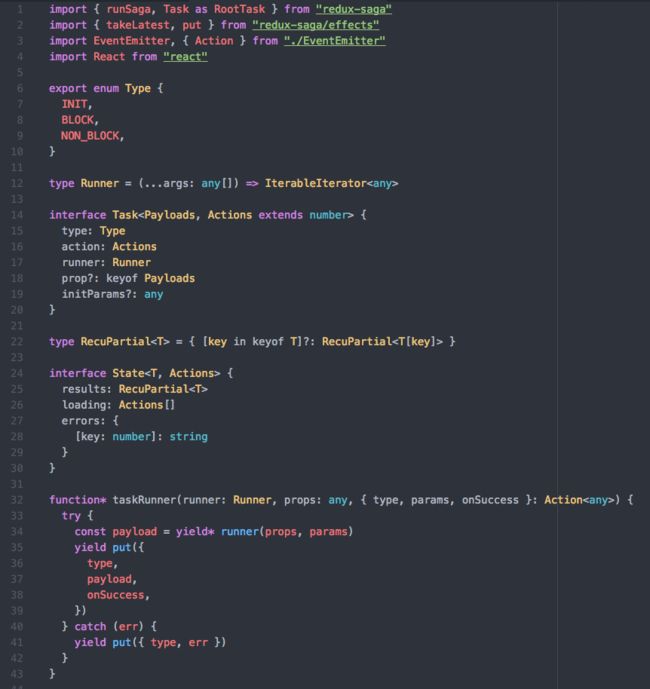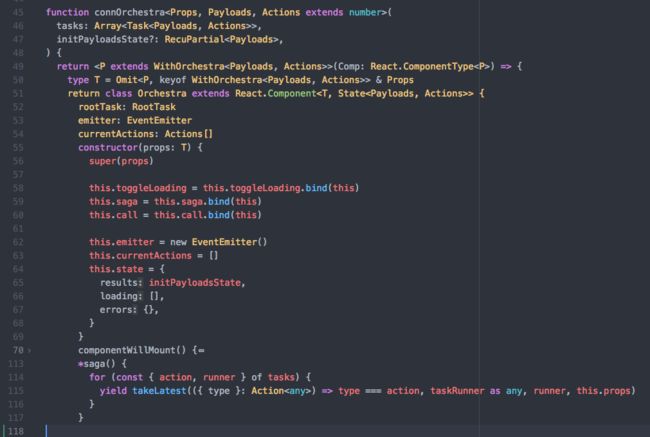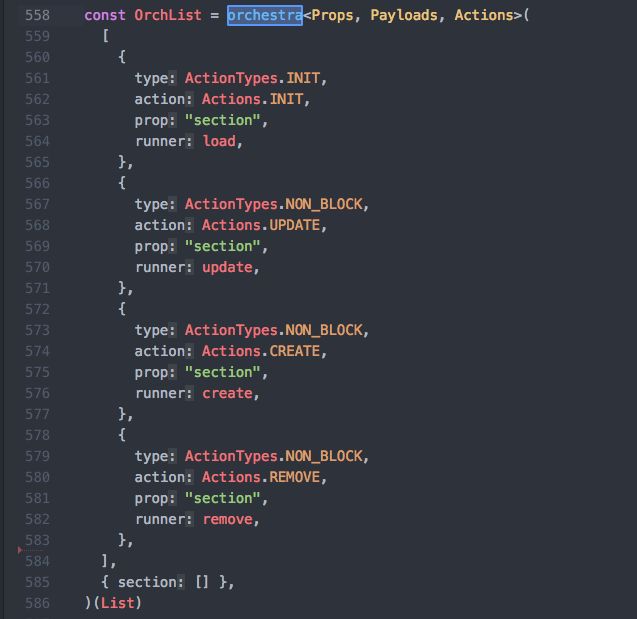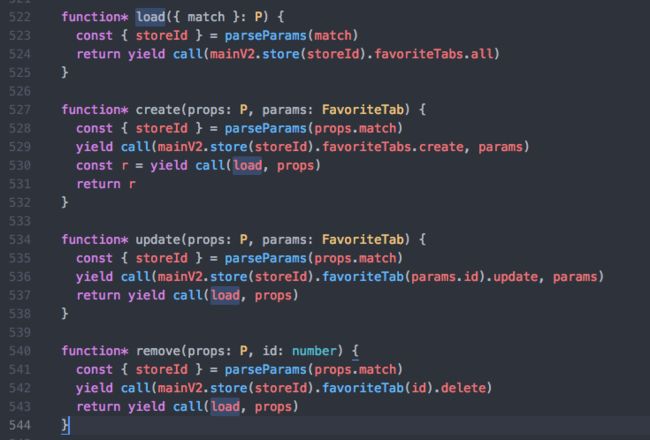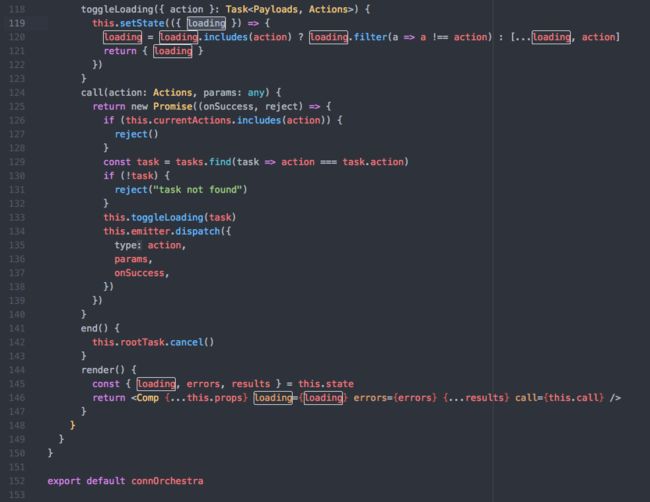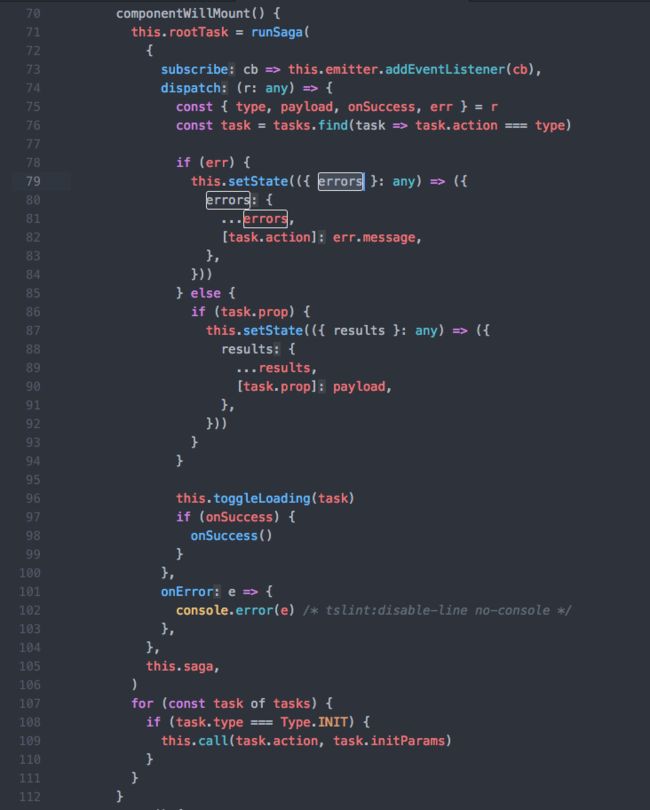当我们的组件里请求非常多(比如今天的需求是一个组件里处理12个请求…),给每一个请求都写一遍loading和错误处理等非常繁琐,因此统一管理请求就很有必要了。orchestra原义为交响乐,这里用作统一处理请求的组件名称。
orchestra本质为HOC高阶组件。
使用时需要定义的属性包括type,action,runner和可选的prop,initialParams.
其中,runner代表调用的函数。
type Runner = (...args: any[]) => IterableIterator
以其中一组CRUD为例,564行的runner即调用522行的load函数,返回值赋给this.props.section.最后的585行为初始值。
loading为一个数组,通过toggleLoading函数来判断当前正在加载还是加载完成的状态。
在展示组件内部,则通过数组的some方法选择展示加载组件还是加载后的页面。
错误处理是一个对象,在构造函数里赋空值,在render渲染组件之前的componentWillMount里改变其值。
完整的源码长这样:
import { runSaga, Task as RootTask } from "redux-saga"
import { takeLatest, put } from "redux-saga/effects"
import EventEmitter, { Action } from "./EventEmitter"
import React from "react"
export enum Type {
INIT,
BLOCK,
NON_BLOCK,
}
type Runner = (...args: any[]) => IterableIterator
interface Task {
type: Type
action: Actions
runner: Runner
prop?: keyof Payloads
initParams?: any
}
type RecuPartial = { [key in keyof T]?: RecuPartial }
interface State {
results: RecuPartial
loading: Actions[]
errors: {
[key: number]: string
}
}
function* taskRunner(runner: Runner, props: any, { type, params, onSuccess }: Action) {
try {
const payload = yield* runner(props, params)
yield put({
type,
payload,
onSuccess,
})
} catch (err) {
yield put({ type, err })
}
}
function connOrchestra(
tasks: Array>,
initPayloadsState?: RecuPartial,
) {
return >(Comp: React.ComponentType
) => {
type T = Omit> & Props
return class Orchestra extends React.Component> {
rootTask: RootTask
emitter: EventEmitter
currentActions: Actions[]
constructor(props: T) {
super(props)
this.toggleLoading = this.toggleLoading.bind(this)
this.saga = this.saga.bind(this)
this.call = this.call.bind(this)
this.emitter = new EventEmitter()
this.currentActions = []
this.state = {
results: initPayloadsState,
loading: [],
errors: {},
}
}
componentWillMount() {
this.rootTask = runSaga(
{
subscribe: cb => this.emitter.addEventListener(cb),
dispatch: (r: any) => {
const { type, payload, onSuccess, err } = r
const task = tasks.find(task => task.action === type)
if (err) {
this.setState(({ errors }: any) => ({
errors: {
...errors,
[task.action]: err.message,
},
}))
} else {
if (task.prop) {
this.setState(({ results }: any) => ({
results: {
...results,
[task.prop]: payload,
},
}))
}
}
this.toggleLoading(task)
if (onSuccess) {
onSuccess()
}
},
onError: e => {
console.error(e) /* tslint:disable-line no-console */
},
},
this.saga,
)
for (const task of tasks) {
if (task.type === Type.INIT) {
this.call(task.action, task.initParams)
}
}
}
*saga() {
for (const { action, runner } of tasks) {
yield takeLatest(({ type }: Action) => type === action, taskRunner as any, runner, this.props)
}
}
toggleLoading({ action }: Task) {
this.setState(({ loading }) => {
loading = loading.includes(action) ? loading.filter(a => a !== action) : [...loading, action]
return { loading }
})
}
call(action: Actions, params: any) {
return new Promise((onSuccess, reject) => {
if (this.currentActions.includes(action)) {
reject()
}
const task = tasks.find(task => action === task.action)
if (!task) {
reject("task not found")
}
this.toggleLoading(task)
this.emitter.dispatch({
type: action,
params,
onSuccess,
})
})
}
end() {
this.rootTask.cancel()
}
render() {
const { loading, errors, results } = this.state
return
